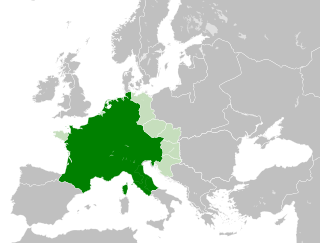
In Greek mythology, the Heracleidae or Heraclids were the numerous descendants of Heracles (Hercules), especially applied in a narrower sense to the descendants of Hyllus, the eldest of his four sons by Deianira. Other Heracleidae included Macaria, Lamos, Manto, Bianor, Tlepolemus, and Telephus. These Heraclids were a group of Dorian kings who conquered the Peloponnesian kingdoms of Mycenae, Sparta and Argos; according to the literary tradition in Greek mythology, they claimed a right to rule through their ancestor. Since Karl Otfried Müller's Die Dorier, I. ch. 3, their rise to dominance has been associated with a "Dorian invasion".
In Greek mythology, Hylluss or Hyllas (Ὕλᾱς) was son of Heracles and Deianira, husband of Iole, nursed by Abia.
In Greek mythology and history, there were at least eight men named Medon.
Agelaus or Agelaos is, in Greek mythology, the name of various individuals.

In Greek mythology, Temenus was a son of Aristomachus and brother of Cresphontes and Aristodemus.

In Greek mythology, Cresphontes was a son of Aristomachus, husband of Merope, father of Aepytus and brother of Temenus and Aristodemus. He was a great-great-grandson of Heracles and helped lead the fifth and final attack on Mycenae in the Peloponnesus. He became king of Messene.

In Greek mythology, Eurysthenes was one of the Heracleidae, a great-great-great-grandson of Heracles, and a son of Aristodemus and Argia. His twin was Procles. Together they received the land of Lacedaemon after Cresphontes, Temenus and Aristodemus defeated Tisamenus, the last Achaean king of the Peloponnesus. Eurysthenes married Lathria, daughter of Thersander, King of Kleonoe, sister of his sister-in-law Anaxandra, and was the father of his successor, Agis I, founder of the Agiad dynasty of the Kings of Sparta.
In Greek mythology, Eurypylus was the name of several different people:

Francia, also called the Kingdom of the Franks, Frankland, or Frankish Empire, was the largest post-Roman barbarian kingdom in Western Europe. It was ruled by the Franks during Late Antiquity and the Early Middle Ages. It is the predecessor of the modern states of France, Belgium, The Netherlands, Luxembourg and Germany. After the Treaty of Verdun in 843, West Francia became the predecessor of France, and East Francia became that of Germany. Francia was among the last surviving Germanic kingdoms from the Migration Period era before its partition in 843.

Caranus or Karanos was the first king of the ancient Greek kingdom of Macedon according to later traditions. According to Herodotus, however, the first king was Perdiccas I. Caranus is first reported by Theopompus and is the mythical founder of the Argead dynasty.
Archelaus is a drama written and performed in Macedonia by Euripides honouring Archelaus I of Macedon on a par with king Caranus. There is no doubt that Euripides transformed Caranus to Archelaus in the play, in an attempt to please Archelaus I of Macedon. In the play, Archelaus son of Temenus was exiled from Argos by his brothers and went to Thrace, to king Cisseus who happened to be at war with neighbouring people and promised Archelaus his kingdom and daughter if he could protect him against the enemies. Archelaus did it and went to ask the king for his promised reward. The king however broke his promise and decided to kill Archelaus by treachery. He therefore gave orders to prepare a pitfall to trap him. But a slave of the king told Archelaus about the plot and the hero asked for a secret interview with the king: when alone he threw him inside the pitfall. He then fled to Macedonia, led by a goat, according to some command of Apollo, and founded the city of Aigai after the goat.
Deiphontes was king of Argos. He was a son of Antimachus, and husband of Hyrnetho, the daughter of Temenus the Heracleide, by whom he became the father of Antimenes, Xanthippus, Argeius, and Orsobia. Deiphontes was descended from Ctesippus, the son of Heracles by Deianira.
In Greek mythology, Hyrnetho was a daughter of Temenus, and the wife of Deiphontes, by whom she became mother of Antimenes, Xanthippus, Argeius, and Orsobia.

The Argead dynasty was an ancient Macedonian royal house of Dorian Greek provenance. They were the founders and the ruling dynasty of the kingdom of Macedon from about 700 to 310 BC.
The name Merops refers to several figures from Greek mythology:
Pheidon I was a king of Argos in the 8th century BC, and seems to have been a son of Temenus, a great-great-grandson of Heracles. He is often confused with another king of Argos also named Pheidon, who was probably one of his descendants.
In Greek mythology, Phegeus was the king of Psophis in Arcadia who purified Alcmaeon after the murder of his own mother, Eriphyle. The town of Phegeia, which had before been called Erymanthus, was believed to have derived its name from him. Subsequently, however, it was changed again into Psophis.
In Greek mythology, Temenus was the name attributed to the following personages:
Oxylus, a one-eyed man from Aetolia, son of Haemon or of Andraemon.